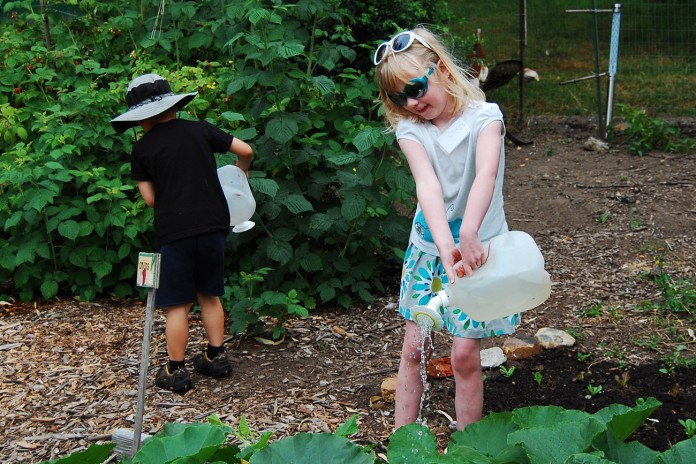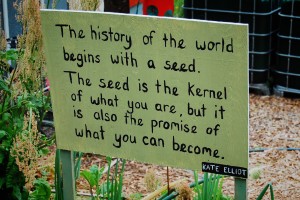 “There are so many people who love us who don’t know they love us,” says Laura Plaut, executive director of Common Threads Farm.
“There are so many people who love us who don’t know they love us,” says Laura Plaut, executive director of Common Threads Farm.
As gorgeous gardens increasingly pop up in our local schools, students – and their parents – are falling in love with the idea of fresh produce that’s grown, harvested, and then eaten by students and staff. But few people realize that the gardens exist because of a partnership between the Bellingham School District and Common Threads Farm.
Common Threads, which launched in 2007 on Lummi Island before moving to Bellingham’s Bobbibrook Farm in 2010, is now located at Western Washington University’s Outback Farm and currently supports growing and learning in 14 school gardens in Whatcom County. Common Threads is always looking for adoptive parents, volunteers, and donors.
Happy Valley Elementary principal Karen Tolliver is just one of the many area administrators who is thrilled with the addition of a garden to her school.
“The Happy Valley garden is the heart of our school community and essential to teaching and learning at our school,” Tolliver says.
Children in preschool through fifth grade at the south side school learn about science, math, social studies, and healthy living through weekly garden visits.
“I love watching students work in the garden,” Tolliver continues. “They learn that they can accomplish big things by working together. And the sense of accomplishment is evident when they find ‘their’ kale, tomatoes, strawberries or lettuce in the school lunch.”
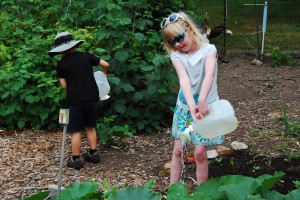 Common Threads came about after Plaut began looking at the world through her two-year-old son’s eyes. She recognized all the marketing directed at his eye level and began hearing a lot of “I want, I want, I want.”
Common Threads came about after Plaut began looking at the world through her two-year-old son’s eyes. She recognized all the marketing directed at his eye level and began hearing a lot of “I want, I want, I want.”
“I thought, well, either I’m going to be a really scolding parent, always telling him not to want what the world tells him to want,” Plaut says, “or I need to find ways to joyfully engage him in things that align with my values.”
Another impetus for Plaut to create Common Threads Farm was the realization that she’d become a reasonably well-educated adult who had never learned how to grow her own food.
“I always say that Common Threads is the program I wanted for myself as an eight-year-old,” she says, laughing.
Common Threads launched in 2007, on Lummi Island. It moved to Bellingham in 2010, with summer programs now taking place at Fairhaven’s Bobbibrook Farm.
“My original vision was for it to be like the Northern Cascades Institute’s Mountain School of food and farming,” Plaut says. “I wanted to be the place kids came to engage in and think about food.”
She quickly realized it made more sense to go where the kids are.
“Lucky kids come to our farm camp,” Plaut says, “but there are a lot of parents that either don’t know about our summer programs or it’s not in their world view or values – and I want those kids to learn about food as much as your kid or my kid.”
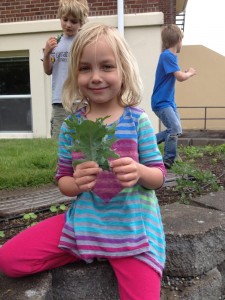 Looking to reach as many children as possible, Common Threads helped launch six school gardens in the fall of 2009.
Looking to reach as many children as possible, Common Threads helped launch six school gardens in the fall of 2009.
It wasn’t simple, and Common Threads didn’t (and doesn’t) do it alone, but with the work of many invested parents, volunteers, and donors – as well as a grant from the Sustainable Whatcom Fund, a donor-advised fund of the Whatcom Community Foundation – they were able to start with a bang rather than a whimper.
“We did what everybody I’ve spoken with nationally says you need to do to be successful with school gardens: We staffed them,” Plaut says. “If you want a school garden to be a meaningful part of the school over the long term, you staff it in the same way you have a PE teacher or a music teacher.”
This has been critical to Common Threads’ success in working with schools.
Generally, Common Threads provides the direction and vision for schools interested in creating their own gardens. “We make sure that the right things get planted at the right time,” Plaut says.
They also partner with Uprising Seeds, a local, family-owned seed company that has donated 95 percent of the seeds put in area school gardens. “We’re so appreciative of them for that,” Plaut says. “It’s been thousands and thousands of dollars of seeds over the years.”
Former Sunnyland teacher Brian Pahl quickly became a Common Threads Farm advocate after he saw his students respond to working in the garden.
Pahl’s fourth graders blogged about their classroom experiences last year, which included reports about visits from Mara Schradle, a Western Washington University graduate and AmeriCorps volunteer working with Common Threads Farm.
A few of those blog posts can be read here, here and here.
“A relationship with Common Threads Farm is really important for the students,” Pahl says. “I think many don’t have gardens at home and may not normally see where their food comes from.”
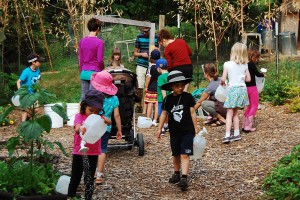 Pahl points out the links between working in the garden and many science standards, which gives them a hands-on opportunity to work with life science concepts. It also addresses social studies standards, studying the different kinds of agriculture grown in Washington state.
Pahl points out the links between working in the garden and many science standards, which gives them a hands-on opportunity to work with life science concepts. It also addresses social studies standards, studying the different kinds of agriculture grown in Washington state.
“Perhaps most important for me, it takes learning outside of the classroom,” he says. “You give students real-world experiences that we can link back to our in-class experiences.”
Pahl loved having a Common Threads team member come to his classroom each week to provide nutrition education, as well as cooking experiences for the class. Plaut’s ideal would be to have a half-time food educator in every school.
“Students made applesauce, zucchini cakes, kale smoothies, and many other things from scratch,” Pahl says. “And many times using ingredients that were grown or sourced locally.”
Plaut points out that Common Threads is looking for systemic change rather than school-by-school change, and now has an agreement with Bellingham Public Schools for shared protocol around harvesting food from the garden to be served in the cafeteria.
Before the school year started, Plaut’s team met with food service staff to ensure everyone was on the same page. Food service staff is of course concerned about food safety, and Plaut wanted to assuage any fears.
 “My feeling is what could possibly be safer than food where the supply chain is about a hundred feet long?” she says, “But because it’s new, it’s been scary for some people.”
“My feeling is what could possibly be safer than food where the supply chain is about a hundred feet long?” she says, “But because it’s new, it’s been scary for some people.”
She praises Mark Dalton, director of food services for Bellingham Public Schools, and his staff for working with Common Threads to make it possible to have school garden-grown food served in the cafeterias.
“The research is abundant,” Plaut says, “that when kids plant it, tend it, and harvest it, of course they want to eat it – because they’ve already fallen in love with it.”
Plaut’s hopes for the future of Common Threads Farm and school gardens? “My dream is that, by the time my sixth grader graduates from high school, kids will kind of scratch their heads and wonder at the idea that there didn’t used to be a garden in every school.”
To learn more about Common Threads Farm, its Preschool in the Garden, Thursday Early Release program, camps, and much more, please visit www.commonthreadsfarm.org. Common Threads is always on the lookout for adoptive parents, volunteers, and donors.





























